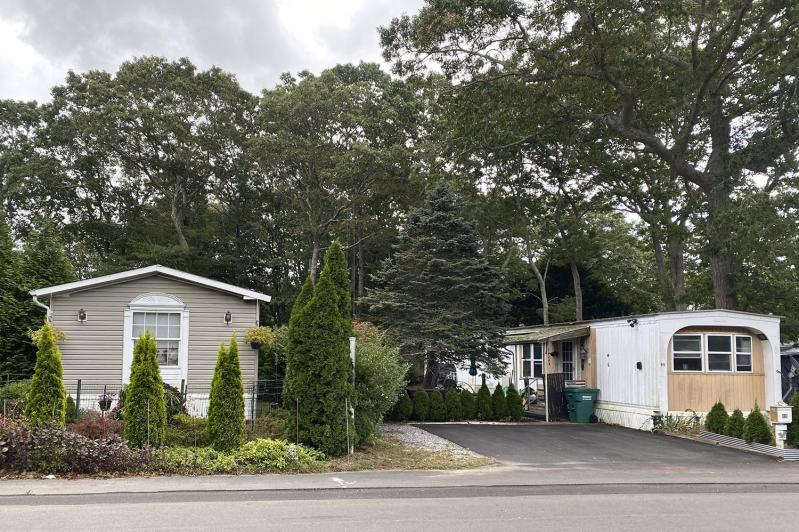With the power line now fixed at East Hampton Village Mobile Home Community following a four-day summer outage, residents heard last week of a new issue stemming from the power failure: a 6-percent rent increase due to either “capital improvements” or increased “operating costs.”
Now, residents wonder: Is that legal?
Under standard circumstances, state law permits a 3-percent rent hike for mobile home parks. However, with “capital improvements,” increases in operating expenses, or increases in property taxes, a park owner can bump rent by up to 6 percent.
R.H.P. Properties, the Michigan company that owns the land, did not specify initially or in an email statement — despite being prompted — which of the three circumstances justified the 6-percent increase.
Joel Brown, president of R.H.P. Properties, reiterated that state laws allow “manufactured home park owners to increase the rent in excess of 3-percent to reflect capital improvements and increases in operating expenses and/or property taxes.”
Since the previous electrical network was a safety hazard — East Hampton Town described certain systems as “not properly wired” and “overloaded” in an August electrical report — residents have said that none of the three criteria should justify the increase.
“They’ve been very lucky that this group of residents has not really come together to try to hit them with some kind of class action lawsuit for having them in unsafe conditions for all these years,” said Minerva Perez, executive director of Organizacion Latino Americana of Eastern Long Island (OLA).
Since the most recent extended outage, which lasted four days in July, OLA has advocated for the residents by holding meetings and communicating with R.H.P. Properties.
As part of the advocacy effort, Ms. Perez created a group chat for residents of the park to communicate. News of the rent hike was relayed last Thursday in the chat.
OLA and R.H.P. Properties had made some progress on general park improvements, Ms. Perez said. For instance, the company appointed a new regional representative to oversee the park. Since then, there has been a reliable line of communication.
“They were making a couple of changes,” she continued. “I’d given them like six pretty big things to work on to really consider, and I thought they were going to tell me to take a hike, but they kind of did a few of those things.”
The main request was to fix the “primary cable,” which was believed to be the source of the problem. To do that, R.H.P. Properties had to work out an agreement with PSEG-Long Island.
Maintenance work on the cable was expected to begin on Aug. 16. Since then, Ms. Perez has not heard complaints about the power, which suggests it has been fixed.
Then, Ms. Perez heard about the rent hike. Nassau Suffolk Law Service has been assisting OLA with the legal issues stemming from the outage, so Ms. Perez asked the nonprofit about the legality of the rent increase. The organization pointed her to the “capital improvements” code section.
“I would love to start with the niceties, but I’m a little shocked by this tactic,” Ms. Perez began in an email to corporate representatives for R.H.P. Properties. While Ms. Perez discussed the email in a phone call, a resident of the community provided the full text.
In the email, she asked the company about the “wording” of the notice, stating that PSEG, for its part, has not placed the cost of repairs on the residents. Jeremy Walsh, a PSEG representative, confirmed this claim, stating that residents “will not be separately charged for this work in their service bills.”
“Given the longstanding issues with electric and the safety concerns, the residents should not be penalized for the act of R.H.P. finally creating a safer electrical system,” the email continued.
In the end, Ms. Perez requested that the company help her “understand” the decision before the community seeks outside legal counsel.
“East Hampton Village is mindful of the financial challenges many of our residents face,” Mr. Brown of R.H.P. said in a statement. “We carefully review all costs and rent increases are based on the operating costs necessary to provide well-maintained, yet affordable communities.”
Ms. Perez is scheduling an in-person meeting with corporate representatives for R.H.P. Properties to discuss the future.
The community hosts a largely working class and Latino population, with its residents working in a variety of fields, such as education, health care, and maintenance.
“If this is what R.H.P. is going to do, it’s not a good thing,” Mr. Perez said of the rent hike over the phone. “We’re in the middle of a region where nothing is affordable, and at this moment, even though this is not good, there is some part of affordability that is still maintained.”
In addition, residents of the park were “never made whole” after the outage over the summer. While they did receive a $300 rent credit for losses incurred during the four-day outage, Ms. Perez said the total cost is far greater than that amount, as the outages have been “documented for years.”
For instance, some residents bought a generator over the summer because “no one had any reason to believe that it just wasn’t going to get worse.”
“A corporate entity is really muscling around this very local and important community, and tearing people apart while being over there in some other state,” Ms. Perez added. “They’re doing it from afar, but the decisions that they’re making are really rocking this community.”
The focus going forward is on communication, Ms. Perez said, as it is “the only issue truly holding this community back.” In the future, she wants to see a community liaison, an emergency plan in both English and Spanish, and a channel for tracking the status of complaints.
“There are a number of residents who are keeping their eyes on a bright future,” Ms. Perez continued. “We’re talking about a holiday party. We want to make sure that it doesn’t just keep devolving into nothing but doom and gloom and fights.”




